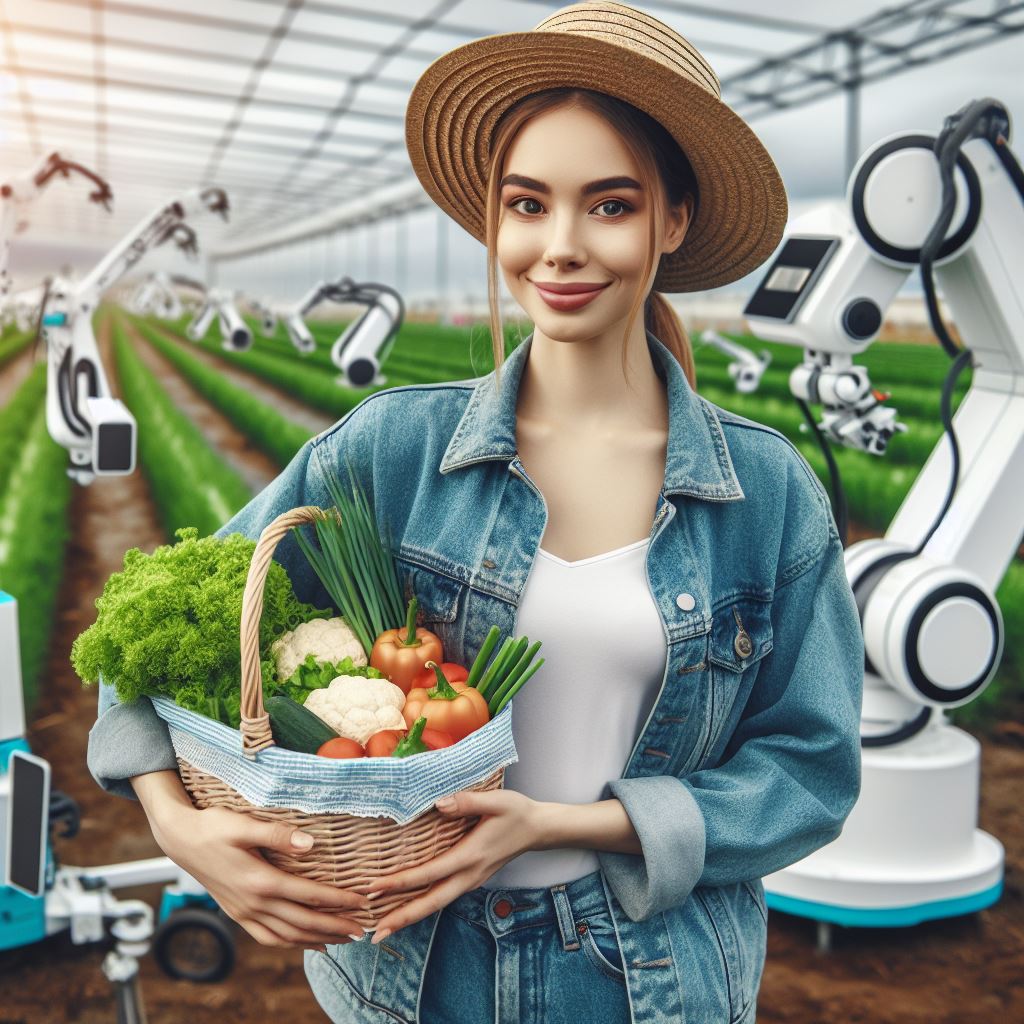Introduction
A. Under 30 Farmers: Changing the Agri-World
The agricultural industry is witnessing a remarkable shift with the emergence of a new generation of farmers under the age of 30.
These young farmers are bringing fresh perspectives, innovative techniques, and a deep understanding of technology to revolutionize the agri-world.
This blog post explores the significance of young farmers in today’s agricultural industry and highlights key points that will be discussed further.
B. The significance of young farmers in today’s agricultural industry
The entry of young farmers has immense importance in the agricultural industry.
Their passion, energy, and willingness to embrace change are vital for the growth and sustainability of the sector.
Unlike their predecessors, these under 30 farmers are not only focused on traditional farming practices but also on adopting advanced technologies and sustainable farming methods.
C. The key points to be discussed in the blog post
In this blog post, we will delve into the reasons why young farmers are crucial for the agri-world.
Firstly, we will explore their ability to bring fresh ideas and innovations to the table.
Secondly, we will discuss how their tech-savvy nature allows them to leverage digital tools and automation for enhanced productivity.
Additionally, we will highlight their commitment to sustainability, as they prioritize environmentally friendly practices.
Furthermore, we will examine the challenges that under 30 farmers face in the agricultural industry.
These include access to capital, land, and resources, as well as the need for mentorship and knowledge exchange.
Finally, we will present success stories of young farmers who have overcome these obstacles and are thriving in the agri-business.
Essentially, under 30 farmers are changing the face of the agricultural industry. Their ability to adapt to changing environmental, technological, and social demands makes them an invaluable asset.
Through this blog post, we aim to shed light on their contributions and inspire others to support and encourage the growth of young farmers in the agri-world.
Transform Your Agribusiness
Unlock your farm's potential with expert advice tailored to your needs. Get actionable steps that drive real results.
Get StartedThe Rise of Under 30 Farmers
A. The increasing number of young individuals getting involved in farming
The number of young individuals getting involved in farming has been steadily increasing.
This trend can be attributed to various reasons, including a growing interest in sustainable agriculture.
The adoption of technology in farming practices has also attracted young farmers to the industry.
The availability of economic opportunities in agriculture has played a significant role in this trend.
Statistics show a rising number of individuals under the age of 30 entering the farming sector.
According to a recent study, the percentage of young farmers has increased by 12% in the past decade.
B. The reasons behind this trend
One reason behind this rise is the increasing awareness and concern for sustainable agriculture.
Young farmers are driven by a desire to make a positive impact on the environment.
They are passionate about implementing eco-friendly farming practices and reducing the carbon footprint.
Another factor contributing to the rise of under 30 farmers is the adoption of technology in agriculture.
Advanced farming techniques and precision agriculture have attracted tech-savvy individuals to farming.
Technology allows young farmers to optimize their operations, increase productivity, and reduce costs.
It also provides them with valuable data and insights to make informed decisions.
The economic opportunities in agriculture have also attracted young individuals to pursue farming.
With the growing demand for organic and locally sourced products, young farmers see potential profits.
Direct-to-consumer selling models, such as farmers’ markets and CSAs, offer a higher profit margin.
Additionally, government initiatives and programs provide financial support and incentives for young farmers.
These incentives include grants, loans, and subsidies to facilitate the entry and success of young farmers.
Overall, the rise of under 30 farmers reflects a shift towards a more sustainable and technologically advanced agriculture.
These young individuals are reshaping the agri-world with their innovative practices and entrepreneurial spirit.
As they continue to enter the industry, the future of farming appears promising and dynamic.
The collaboration between experienced farmers and the new generation brings a wealth of knowledge and fresh ideas.
Together, they are driving the agricultural sector towards greater efficiency, sustainability, and profitability.
Generally, the increasing number of young individuals getting involved in farming can be attributed to a growing interest in sustainable agriculture, the adoption of technology, and the availability of economic opportunities.
Showcase Your Farming Business
Publish your professional farming services profile on our blog for a one-time fee of $200 and reach a dedicated audience of farmers and agribusiness owners.
Publish Your ProfileThese trends are shaping the agri-world and leading to a more innovative and successful industry.
Challenges Faced by Under 30 Farmers
Young farmers face a unique set of challenges as they embark on their agricultural journey.
These challenges can hinder their progress and success in the agri-world, but with the right support, they can overcome these obstacles and thrive.
A. Unique challenges that young farmers encounter
1. Financial constraints and difficulties in securing loans or acquiring land
One of the biggest challenges that under 30 farmers face is financial constraints.
Starting a farm requires significant capital investment in land, equipment, and infrastructure.
However, many young farmers struggle to secure loans or acquire land due to their limited financial resources or lack of credit history.
Without access to proper funding, it becomes challenging for them to establish their farms and sustain their operations.
2. Lack of experience and established networks
In addition to financial constraints, young farmers also lack experience and established networks in the agricultural industry.
Unlike older farmers who have spent years honing their skills and building connections, young farmers are often starting from scratch.
This lack of experience and networks can make it difficult for them to access resources, market their products, and navigate the complex agricultural landscape.
It can also lead to feelings of isolation and uncertainty, as they may not have mentors or peers to turn to for guidance.
B. The need for mentorship and support systems for these farmers
To address these challenges, it is crucial to establish mentorship and support systems for under 30 farmers.
Mentors can provide invaluable guidance, knowledge, and advice based on their own experiences in the industry.
They can help young farmers navigate challenges, make informed decisions, and develop essential skills.
Additionally, support systems that bring together young farmers can create a sense of community and collaboration, allowing them to share resources, ideas, and support each other’s growth.
Moreover, government initiatives and agricultural organizations play a vital role in supporting under 30 farmers.
These entities can provide financial assistance, grants, or subsidies tailored to the needs of young farmers.
They can also facilitate networking opportunities, training programs, and workshops to help young farmers gain the necessary skills and knowledge to succeed in the agri-world.
Furthermore, it is essential to promote awareness about the challenges faced by under 30 farmers and advocate for policy reforms that address their specific needs.
By highlighting their struggles and amplifying their voices, we can create a more supportive and inclusive environment for young farmers.
Summarily, under 30 farmers encounter unique challenges that can hinder their progress and success in the agri-world.
Financial constraints, lack of experience and networks, and the need for mentorship are some of the main challenges they face.
However, with the right support systems, including mentorship programs and government initiatives, young farmers can overcome these challenges and contribute to the future of agriculture.
Read: Next-Gen Farmers: Shaping Agriculture’s Future

Innovative Practices and Technologies
A. Cutting-edge practices, techniques, and technologies implemented by under 30 farmers
Under 30 farmers are implementing cutting-edge practices, techniques, and technologies on their farms.
B. The use of precision agriculture, data analytics, drones, and other modern tools
Precision agriculture is being widely used by young farmers to optimize crop production and resource management.
Data analytics play a crucial role in helping farmers make informed decisions about planting, fertilizing, and harvesting.
Drones are revolutionizing the agricultural sector, assisting in crop monitoring, and surveying vast farmlands efficiently.
Modern tools such as soil sensors, weather stations, and GPS technology are enhancing productivity and reducing waste.
Young farmers are adopting innovative irrigation systems to conserve water and promote sustainable farming practices.
The use of hydroponics and vertical farming techniques is gaining popularity among under 30 farmers for maximizing yield in limited spaces.
Utilizing automation and robotics in agriculture has significantly increased efficiency and reduced manual labor.
Young farmers are implementing advanced genetic technologies to enhance crop traits and improve resistance to pests and diseases.
C. Examples or success stories from young farmers
Success stories of young farmers using unmanned aerial vehicles (UAVs) to detect plant stress and optimize fertilizer application.
One exemplary young farmer uses satellite imagery and machine learning algorithms to predict crop yields accurately.
Another inspiring story is of a farmer who developed a mobile app to remotely monitor livestock health and maximize productivity.
An under 30 farmer successfully integrated automated milking systems into his dairy farm, enhancing milk production and reducing labor costs.
D. How these innovations improve efficiency, productivity, and sustainability
Young farmers are utilizing blockchain technology to ensure the traceability and authenticity of their produce.
Smart farming techniques, such as IoT-enabled sensors, are enabling real-time monitoring and analysis of environmental conditions.
Under 30 farmers are harnessing renewable energy sources such as solar and wind power, reducing dependence on traditional energy systems.
Showcase Your Farming Business
Publish your professional farming services profile on our blog for a one-time fee of $200 and reach a dedicated audience of farmers and agribusiness owners.
Publish Your ProfileYoung farmers are actively involved in implementing integrated pest management strategies, minimizing the use of chemical pesticides.
Innovative crop rotation techniques practiced by under 30 farmers contribute to soil health and the prevention of nutrient depletion.
Young farmers are collaborating with agricultural researchers to develop and test new technologies tailored to their specific needs.
One inspiring success story is of a young farmer who introduced aquaponics, combining fish farming with hydroponic vegetable production.
Multiple under 30 farmers have created online platforms to share their knowledge, experiences, and innovative practices with fellow farmers.
Read: Innovative Farming: The Youth’s Approach
Impact on the Agri-World
A. The positive changes brought by under 30 farmers in the agricultural industry
Under 30 farmers have revolutionized the agricultural industry and brought about positive changes.
Their innovative approaches and contributions to sustainable farming practices, environmental conservation, and food security have garnered recognition and inspired older farmers.
Let’s explore how these young farmers are shaping the future of agriculture.
B. Their contributions to sustainable farming practices, environmental conservation, and food security
Firstly, under 30 farmers have embraced sustainable farming practices, such as organic farming and permaculture.
They prioritize soil health, use natural fertilizers, and employ crop rotation techniques.
These practices reduce the reliance on chemical inputs, promote biodiversity, and ensure long-term productivity of the land.
Furthermore, young farmers have shown a strong commitment to environmental conservation.
They actively engage in practices that help protect and preserve natural resources.
Utilizing renewable energy sources, implementing water-saving irrigation systems, and applying precision farming techniques are just a few examples of their efforts.
By adopting these approaches, they minimize the environmental impact of agriculture and contribute to the overall sustainability of the industry.
In terms of food security, under 30 farmers are playing a crucial role.
They have recognized the need to produce more food to feed a growing global population.
Through their innovative techniques, they are maximizing land use efficiency, increasing crop yields, and improving food production systems.
By ensuring a steady supply of nutritious food, young farmers are helping to meet the world’s ever-increasing demand.
The innovative approaches of these young farmers have not only impacted the agricultural industry but also inspired and influenced the older generation of farmers.
Experienced farmers are now open to adopting new techniques and technologies that have been introduced by the younger generation.
The exchange of ideas between different age groups has led to a positive transformation in the agricultural practices followed for generations.
C. Awards, recognition, or collaborations involving young farmers
Recognizing the remarkable efforts of under 30 farmers, several organizations and institutions have awarded them for their achievements.
The Young Farmer of the Year award, Sustainable Agriculture Innovation Grant, and the 30 Under 30 Food and Agriculture Awards are just a few examples of the recognition received by exceptional young farmers.
These accolades not only motivate the recipients but also highlight the importance of their contributions to the agricultural industry.
Moreover, collaborations involving young farmers have gained momentum in recent years.
They actively participate in partnerships with research institutes, universities, and government agencies.
These collaborations aim to further enhance sustainable farming practices, develop innovative technologies, and provide better support systems for young farmers.
By working together, they are paving the way for a more resilient and sustainable agri-world.
Overall, under 30 farmers have positively impacted the agricultural industry through their sustainable farming practices, environmental conservation efforts, and contributions to food security.
Their innovative approaches have inspired older farmers and generated collaborations to enhance the future of agriculture.
With their dedication and passion, these young farmers are revolutionizing the agri-world and ensuring a sustainable future for generations to come.
Read: Tech Meets Soil: Young Farmers’ Tales
Future Prospects and Opportunities
A. Potential Growth and Opportunities for Under 30 Farmers
- The under 30 farmers have immense potential for growth and numerous opportunities in the agricultural industry.
- With technological advancements, young farmers can leverage digital tools to enhance productivity and efficiency.
- Access to global markets through e-commerce platforms opens up new avenues for under 30 farmers.
- The growing interest in sustainable and organic farming provides a significant opportunity for young farmers to establish themselves in the market.
- In the face of climate change and increasing concerns about food security, young farmers can play a vital role in implementing innovative solutions.
B. Increasing Demand for Organic, Locally Sourced Produce
- Consumers are becoming more conscious of their health and the environmental impact of food production.
- This has led to a surge in demand for organic, locally sourced produce, creating a market niche for under 30 farmers.
- Youthful farmers can meet this demand by adopting sustainable practices and offering high-quality organic products.
- Collaboration with local restaurants, farmer’s markets, and community-supported agriculture programs can further boost their market presence and profitability.
- By targeting health-conscious consumers, under 30 farmers can establish a loyal customer base and secure long-term success.
C. Potential for Agritourism, Urban Farming, and Direct-to-Consumer Sales
- Agritourism, such as farm visits, workshops, and farm-stay experiences, presents a lucrative opportunity for young farmers.
- By providing unique and educational experiences, they can diversify their income streams and promote agricultural awareness.
- Urban farming is gaining popularity as more people seek locally grown food in urban areas.
- Under 30 farmers can utilize limited spaces and vertical farming techniques to grow produce within cities, meeting the increasing demand.
- Direct-to-consumer sales through online platforms and farmer’s markets allow young farmers to bypass middlemen, increase profitability, and build direct relationships with consumers.
D. Existing Support Programs and Initiatives for Young Farmers
- Recognizing the importance of young farmers, various government and non-profit organizations have implemented support programs.
- These programs offer financial assistance, training, mentorship, and access to resources necessary for young farmers to thrive.
- Initiatives like subsidized land leases, grants for equipment purchase, and low-interest loans alleviate the financial burden on under 30 farmers.
- Mentorship programs connect experienced farmers with young farmers, providing guidance and knowledge transfer.
- Networking events and agricultural conferences allow young farmers to connect with industry professionals and learn about the latest trends and practices.
Ultimately, the future prospects and opportunities for under 30 farmers are promising.
With their innovative mindset and access to resources, young farmers can drive the growth of the agricultural industry.
The increasing demand for organic, locally sourced produce, coupled with the potential for agritourism, urban farming, and direct-to-consumer sales, provides multiple avenues for success.
Support programs and initiatives further empower young farmers by offering financial assistance, mentorship, and networking opportunities.
It is an exciting time for under 30 farmers, as they have the potential to revolutionize the agri-world and contribute to a sustainable and resilient food system.
Read: Green Thumbs Up: Youth Transforming Farms
Showcase Your Farming Business
Publish your professional farming services profile on our blog for a one-time fee of $200 and reach a dedicated audience of farmers and agribusiness owners.
Publish Your ProfileConclusion
A. Summary the key points discussed in the blog post
The rise of under 30 farmers is revolutionizing the agri-world.
These young individuals bring fresh perspectives, innovative technologies, and sustainable practices to the field.
They are essential in shaping the future of agriculture.
B. The importance of under 30 farmers in shaping the future of agriculture
Under 30 farmers offer hope for a more sustainable and efficient agricultural industry.
Their dedication to organic farming, precision agriculture, and vertical farming has the potential to address the global food security challenge.
C. Encouragement for readers to support and promote the next generation of farmers
Supporting and promoting the next generation of farmers is crucial.
By buying local produce, investing in agricultural education, and advocating for policies that support young farmers, we can ensure a thriving and resilient agricultural sector.
D. Call to action
As we look ahead, let us reflect on the importance of under 30 farmers in securing our food future.
Will we embrace their ideas and give them the resources they need to thrive? The power is in our hands to shape the future of agriculture.




